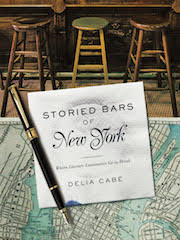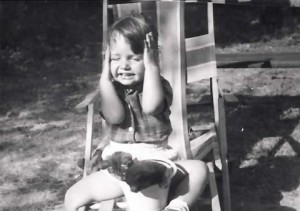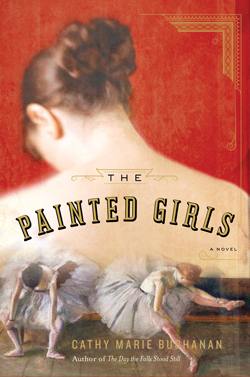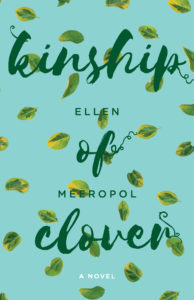Book launch day shoots towards me like an asteroid.
Three weeks.
Not ready.
Almost-final drafts of essays surround me. Fear, sleeplessness, and worry consume me. I won’t get reviewed. I will get reviewed—but they will all hate me. I have nothing to wear to events. Okay, I do have stuff to wear, but nothing will fit, since I can’t stop eating.
Anyway, it doesn’t matter, since no one will come to my launch readings.
Okay. My husband will come. (That’s a law, right?)
And maybe my daughters. My best friends. I start counting ‘sure shows’ on my fingers, wondering what’s the tipping point between total mortification, simple humiliation, awkward embarrassment, and almost respectable.
Misery adores company, so I turn to friends (quid pro quo! maybe if I include them, they’ll come to my reading! I’ll go to theirs!) to see how they feel as they approach their moment. Delia Cabe’s (she wrote a gorgeous book about bars in New York, Storied Bars of New York: Where Literary Luminaries Go to Drink) fears link nicely to her book:
“My fear besides everything? That people will show up, drink cocktails, find errors in my book and not buy it.â€
People ask if it gets easier?
Um.
No.
Debut authors like Delia are shocked that I still wring my hands and think about Xanax with my fourth novel. I look back at something I wrote about this in 2010 and realize, nope, I haven’t grown at all: not spiritually or emotionally. Okay, according to my scale, maybe I’ve grown physically.
Writing a book takes intense concentration, imagination, the ability to read the same 400 pages time after time, the fortitude to take criticism from your writer’s group, agent, and editor and then revise the novel ten more times. You must learn to shut out all noise at a given moment and you must love solitude.
Getting your book in reader’s hands requires the opposite: writing in 140-character soundbites; talking about oneself while sounding modest; balancing online me! me! me! without having REGO (reader’s eyes glaze over) or worse, RSOY (readers sick of you.) You must possess clothes other than ten-year-old sweats.
“You have to sell it one book at a time,” my agent warned me when I published my first novel.
How was I supposed to do that? I pictured walking door to door with a box of books slung around my neck like a nightclub cigarette girl.
In terror, I read every book I could find on the topic, (thus buying their books), listened to experienced writers, attended forums on promotion, jumped from one online site to another, lurked in online forums (and finally came out of the closet and wrote sad plaintive pleas on same forums.)
The problem is that except for the most ego-driven or ego-protected among us, promotion is an unnatural position for most writers. We like working in pajamas. We like watching sentences unfold as ideas unfurl. Shaking our booties doesn’t come naturally. You better learn techniques to go from mug shot before, to Giorgio Armani make-up counter after, if you’re as neurotic as I am.

But to sell, we must. And we quake. M.J. Rose, a NYT bestselling, hugely talented, multi-published author (her newest is The Secret Language of Stones) speaks for all of us, when she says:
“What don’t I fear? There are so many things that can go wrong– that have gone wrong for me over the years. Bookstores not unpacking the cartons. The book being printed with 50 pages missing and 50 pages repeated. The coop promised at the big chain lost in email and no placement for the book at all. The price wrong on Amazon. My ads disappearing. A terrible review in one of the 2 most prestigious newspapers in the country. No one caring. No one caring. No one caring.â€Â
She’s not alone. From the experienced MJ, we go to debut author, Crystal King, author of the richly detailed Feast of Sorrow:
“For my launch, I’m terrified that no one will show up, particularly after I read recently that people don’t go to book launches much anymore. I have the great fortune to know a lot of people and was worried that the area bookstore locations aren’t big enough to hold people I will invite, so I’m working with a bookstore to do my launch at the Cambridge public library auditorium, which holds 250 people! I’m sure I’m not going to get that many people, but I think I should be able to fill half of it or more. But what if I don’t? Will I be giving my book spiel to a handful of people in a huge empty room? Since my book is about the world’s first “foodie,” I’m catering it with little ancient Roman tidbits. What if there isn’t anyone there to eat them and that money is down the drain?â€
We chase our tails in this cycle of fear: No one will come! Too many will come and I won’t have enough food! No one will come!
 Cathy Marie Buchanan, author most recently of the poignant NYT bestselling novel, The Painted Girls was on that carousel: My publisher held a media lunch at a swanky French restaurant in NYC. When I first saw the guest list, terror rippled though me (Culture Editor from Vogue, Books Editor from Entertainment Weekly, etc.) because I thought no one would come. The second wave of terror came when I learned that I’d been very wrong.
Me? I’m constantly reminding myself to smile, no matter what the circumstance. When I got a crowd of two (it happened) at a library (I made the mistake of showing up during a Nor’easter. Okay, maybe not a Nor’easter—but it was snowing!) I gathered them into a cozy circle—grabbing the librarian to join us—and said “hey, what have you always wanted to know about publishing? I’ll give you the gossip!â€
Nice! My grandmother’s saying came back: “Being nice is the most important thing in life.” So I take off my wooden, suspicious, hunted, daytime face look and bring forth my vulnerable, and yes, nice side. (And I comb my hair.)
I’d willingly have said anything to ensure they didn’t feel sorry for me. (Smile!) I sold two books that night. Maybe they were pity-purchases, but I like to think my giggling with them over tiny audience (them) helped.
Weather watching is a favorite activity for writers. Ellen Meeropol, launching her third novel, Kinship of Clover admits “My biggest fear for my book launch is ice. An ice storm. That’s what happened with my second novel. The first time was great weather and the crowd was everything I’d dreamt of. Not so with the ice storm. Maybe three dozen hearty New Englanders showed up and we all left early to creep home. This time, the launch is early April. That should be okay, right?â€
Here’s the uncomfortable truth. If we followed our fantasy of writing and publishing, and want to sell said books, we must then follow up on working on us. We must learn how to sell without appearing crazed — because nobody likes the snake oil man. We must swallow our pride and put it out there. We must balance being entertaining without coming across as so entranced by ourselves that people back away in horror.
None of us succeed all the time. Me? With my first novel, I got an email from the moderator of an online camp alumni group to which I belong. I’d sent out a group email inviting members to a reading I’d be giving in NYC, and received this squirm-inducing scold: I discourage using this group for personal promotion. Please refrain in the future.
Shame overcame me as my self-image went from energetic-information-sharer to self-promoting-hussy. I imagined whispers in the online hallways: Who does she think she is? God, enough, already. Will she ever shut up about that damn book?
I whine. But they said I must….
Yeah. Sure. It’s hard out there for a pimp. But, I remind myself: this is my dream. Suck it up, self. I pray my reader-friends forgive us each day our daily shilling. If they have it in their hearts, and they like our books, we pray that they (please!!) pass the word along. (A review on Amazon or B&N or Goodreads is pure gold.)
Meanwhile, I remind myself not to overdo it online and cut out the whining. Passion attracts. Sullen shuffling, not so much.
I look for a launch buddy or two. Or three. Someone with whom I can be as whiny and self-pitying as I need, someone who won’t judge me for it. BFF launch sisters and brothers. One of my launch sisters (our books come out the same day!) is Meta Wagner, author of What’s Your Creative Type— (filled with just the right kind of reflective/funny information I long for.)  We even planned an event together with Papercuts JP Bookstore. Which led to this night terror for Meta:
I believe the dream I had last night conveys one source of great anxiety: What if no one shows up to any of my readings? Or, what if everyone shows up to one reading and no one comes to the others and I’m forced to address rows of empty seats? In my dream, I was doing an event that Randy (in real life) invited me to do with her, and we were in an auditorium with a packed audience when, suddenly, a hostage-taker entered and wouldn’t let anyone leave. Now, I don’t know if one or both of us had hired him or not, but all I could think after I woke up was: Even if people come, is that really what it’s going to take to get them to stay?!
I guess that’s what makes a true launch buddy—you even get to join in her nightmares. That’s what friends are for.
And now for the Love Us, Buy Us, Read Us!
“Phoebe and Jake fell in love when they were teens and married young. Jake, having a knack for numbers, slowly built himself up in the financial industry, creating a dynasty by the time he was an adult—However, as it turns out, Jake has been supporting his family under the shroud of an elaborate Ponzi scheme that went on for much longer than he thought possible. Full of deceit, scandal, and guilt, The Widow of Wall Street expertly explores how rising to the top only to hit rock bottom affects a family. The consequence will leave readers reeling, as Phoebe struggle to understand Jake’s reason and redefine her life in the aftermath. —Library Journal (releasing April, 11)

For well-read drinkers and boozy bookworms everywhere comes Storied Bars of New York, a photographic and historical celebration of the best literary pubs, cocktail bars, and taverns of New York City. Every chapter profiles an influential bar and comes complete with photographs, a laundry list of the writerly clientele, a recipe for the establishment’s signature cocktail (as well as which authors were likely to order it), and a snapshot of its place in New York culture at the time of its eminence, as demonstrated by quotes from authors and excerpts from magazine reviews. (Releasing June 6, 2017)
“A dazzling mix of history, mystery and mystical arts . . . Rose’s paranormal historical bewitches from start to finish. Her amazing ability to make her story line believable and her extraordinary protagonist relatable result in an unforgettable psychic thriller.” —Library Journal (Starred review) Hardcover available; paperback release June 6, 2017
“King’s descriptions of the food and entertainment are exquisite, her characters are beautifully drawn, and events and people of the times are deftly woven throughout this engrossing novel. One hopes to see more works by this author and self-described culinary enthusiast.â€â€” Library Journal (Starred Review) releasing April 25
“In The Painted Girls, a historically based work of fiction rich with naturalistic details of late-19th-century Paris, Cathy Marie Buchanan paints the girls who spring from the page as vibrantly as a dancer’s leap across a stage. . . . a captivating story of fate, tarnished ambition and the ultimate triumph of sister-love.â€â€” The Washington Post (available now)
“Midway through this wonderful novel, you will find a woman dancing in her wheelchair. That scene is one of many memorable moments in a story about young people organizing for a sustainable future, even as their once-radical elders try to hold on to a gradually disappearing past. This is a book about time and love, politics and family, and it is sharply observant and deeply compassionate.â€Â – Charles Baxter (releases April 4, 2017)
What’s Your Creative Type? by Meta Wagner (Seal, May 2017) looks at how personality affects creative style, helping readers use that knowledge to be more innovative in any pursuit. Each chapter identifies a different creative type using a personality quiz: for example, an affirmative answer to “Do you hope people will be talking about you and your work decades or even centuries from now?†signifies what Wagner calls an A-lister.
The book also profiles well-known figures who fit each type. “We’re starting to see a broader audience for creativity books—business readers and hobbyists, not just what we would think of as ‘traditional artists.’†Publisher’s Weekly (releases April 11, 2017)
Â
Â










